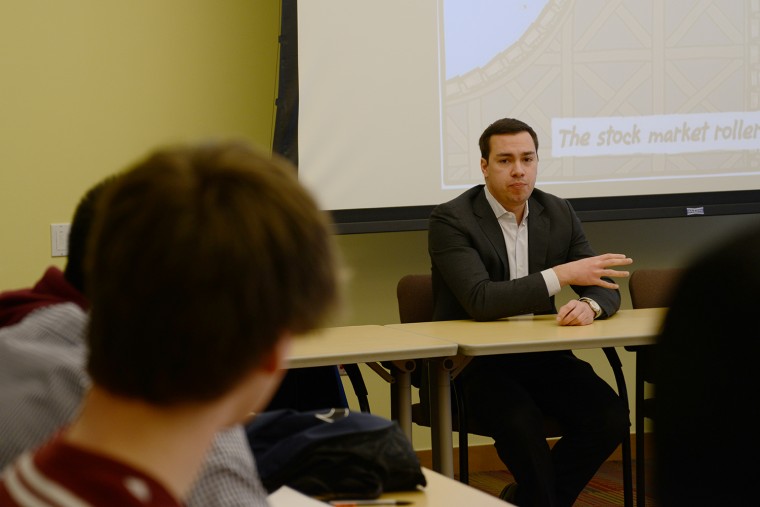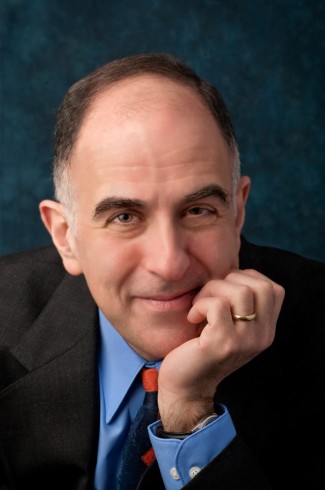Richard Grossman, professor of economics, recently presented a talk titled, "An historical perspective on regulatory competition versus cooperation: the view from economics" at the third annual Conference of the University Research Priority Program. The conference, held June 1-2 at the University of Zurich Institute of Law, was titled, "International Aspects of Financial Regulation: Competition vs. Coordination." Grossman's talk focused on cross-border cooperation between international bank regulators in the wake of the U.S. subprime and European debt crises—an effort to enhance banking stability. Examples include the Basel capital accords and European Stability Mechanism. Grossman put these into historical context by looking at…
Gary Yohe, the Huffington Foundation Professor of Economics and Environmental Studies, wrote in The Hartford Courant about Pope Francis' encyclical on climate change--"a very valuable and much needed injection of morality into the scientific and economic discussions on climate change — it is quite likely a game-changer." While scientists, economists and other professionals have long made a case for taking action to reduce emissions and mitigate the effects of climate change, Yohe writes, "The pope's encyclical adds a moral dimension to this case with nearly 200 pages of inspiring text about man's pollution and the immorality of emissions. He notes that the…
MarketWatch columnist Howard Gold turned to Professor of Economics Richard Grossman for his take on reforming the Fed. Gold took issue with calls from presidential candidate Sen. Rand Paul and others to "audit the Fed," but instead advocated for term limits for Fed chair-persons and changes in the pivotal Federal Reserve Bank of New York. On the matter of term limits for the Fed chair, Grossman spoke of former chairman Alan Greenspan, who stuck around nearly 19 years. (more…)
Professor of Economics Richard Grossman recently presented the keynote address at a conference held at the Austrian National Bank. The presentation, made on March 11, was titled, "Interest rate cycles and implications for the financial sector: a long-term view." A summary is available here. The conference was jointly sponsored by Austria's central bank (the Oesterreichische Nationalbank), SUERF (the European Money and Finance Forum), and BWG (the Austrian Society for Bank Research).
Richard Grossman, professor of economics, is featured in a radio interview with Share Radio in London Feb. 19. In the interview, Grossman talks about the consequences of the European Central Bank's new quantitative easing (QE) policy, which may stimulate an economy when a standard monetary policy has become ineffective. The ECB's action follows in the footsteps of the central banks of Japan, the United Kingdom, and the United States, which also have used quantitative easing in the 2000s. A concern that has been raised about the introduction of QE is that persistent low interest rates will lead to another boom-bust…
Bill Craighead, assistant professor of economics, is the co-author of "Current Account Reversals and Structural Change in Developing and Industrialized Countries," published in the February issue of The Journal of International Trade and Economic Development. The paper compares the experience of high-income and developing countries in adjusting current account deficits, which measure how much they are relying on external borrowing. In both types of country, construction is the most sensitive sector to the current account. On average, adjustments in developing countries are more severe, but that is mainly due to the effects of currency crises. When you take those out, they…
On Feb. 6, recent Wesleyan graduates returned to campus and shared their experiences in finance. The conference, titled "Finance — Theory and Applications: A Conversation with Alumni," covered mergers and acquisitions, value investing, trading and case study analysis. Attendees also had an opportunity to ask questions. Anand Gopalan ’09, James Hounsell ’11 and Eugene Wong ’09, all of whom have relevant experience in the field of finance, spoke at the event. Joyce Jacobsen, professor of economics, also gave remarks at the conference. The event was hosted by Abigail Hornstein, associate professor of economics, with support from the Allbritton Center for the Study of Public Life…
Professor of Economics Richard Grossman recently accepted two new posts. He was appointed to be a research fellow in the Economic History Program of the London-based Centre for Economic Policy Research (CEPR). Founded in 1983, CEPR's mission is "to enhance the quality of economic policymaking within Europe and beyond, by fostering high quality, policy-relevant economic research, and disseminating it widely to decision-makers in the public and private sectors." Grossman is one of only a few American research fellows at CEPR. He was also recently appointed associate editor for socioeconomics, health policy and law of the journal Neurosurgery. See here for a bio of…
Masami Imai, professor of economics, professor of East Asian studies, is the co-author of an article titled "Attribution Error in Economic Voting: Evidence from Trade Shocks," published in the January 2015 edition of Economy Inquiry, Volume 53, Issue 1, pages 258-257. Rosa Hayes '13, currently a research analyst at the Federal Reserve Bank of New York, also is one of the paper's co-authors. This article exploits the international transmission of business cycles to examine the prevalence of attribution error in economic voting in a large panel of countries from 1990 to 2009. Masami and his co-authors found that voters, on average, exhibit…
Richard Grossman, professor of economics, delivered a keynote speech at the 10th Chief Risk Officer Assembly in Munich, Germany on Nov. 19. The speech was based on his book, WRONG: Nine Economic Policy Disasters and What We Can Learn from Them (Oxford University Press), and focused the consequences of government policy for economic risk. The CRO Assembly is organized by Geneva Association, an insurance industry think-tank, and the CRO Forum, which is made up of chief risk officers from large (primarily European) multi-national insurance and re-insurance companies. The conference took place at the headquarters of Munich RE, one of the world’s largest…
On Oct. 24, Richard Grossman, professor of economics, was a discussant at a conference titled “Organizations, Civil Society, and the Roots of Development," organized by the National Bureau of Economic Research in Cambridge, Mass. Grossman commented on a paper by Dan Bogart (University of California at Irvine) titled “Securing the East India Monopoly: Politics, Institutional Change, and the Security of British Property Rights Revisited.” The paper focuses on the history of the English East India Company and ways it yields new insights on the relationship between politics, institutional change, and the security of property rights in Britain.
Richard Grossman, professor of economics, was invited to become a Research Network Fellow of CESifo, a leading European economic research organization based in Munich, Germany. The CESifo Group consists of the Center for Economic Studies at the Ludwig Maximilian University of Munich, the Ifo Institute of Economic Research, and the CESifo Munich Society for the Promotion of Economic Research. CESifo combines the theoretically oriented economic research with empirical research and is often at the center of economic policy debates in Germany and throughout Europe. As a fellow, Grossman will be a member of the Network’s Money, Macro, and International Finance area and…



